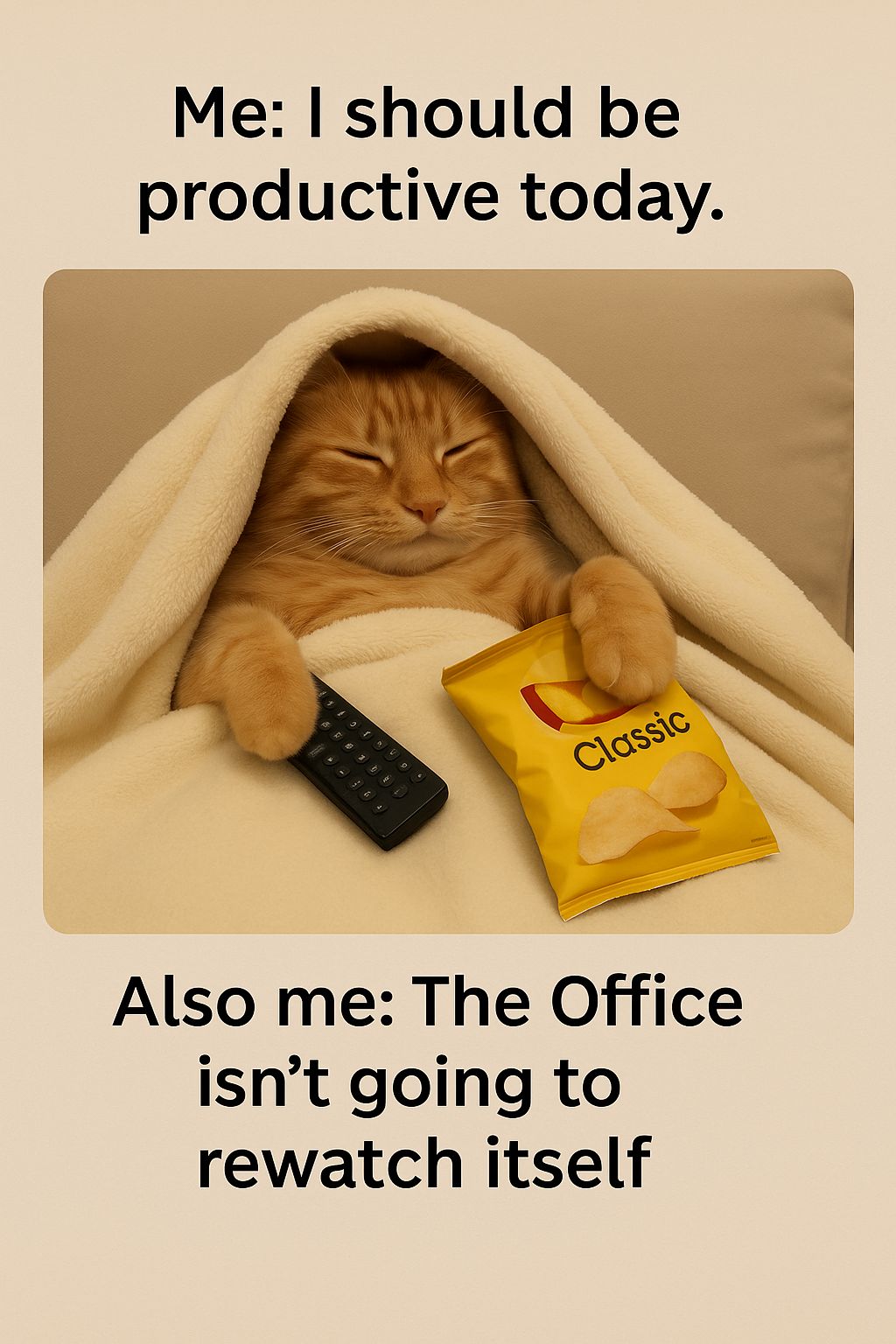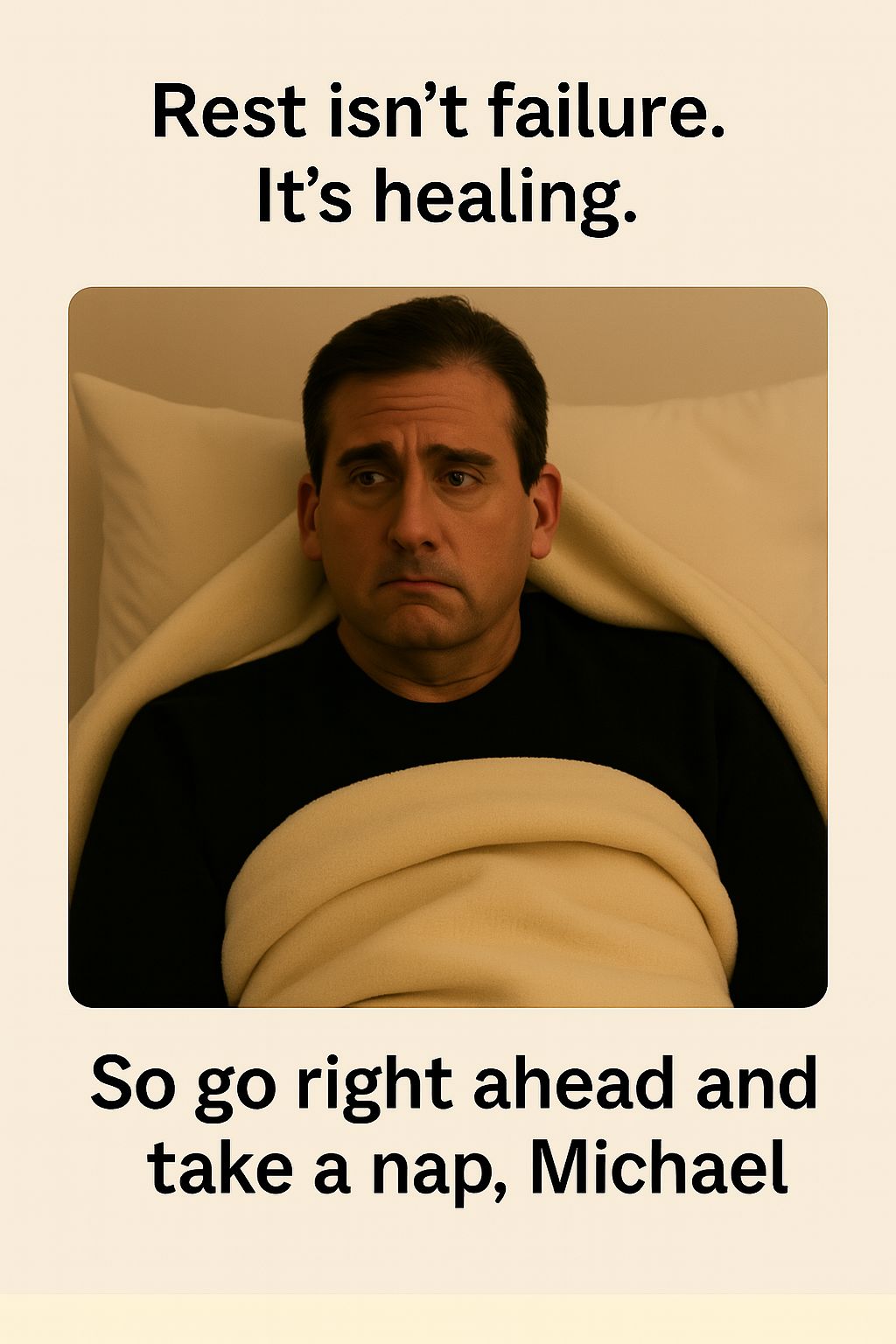- Mental Health Mail
- Posts
- Rewatching The Office As Medicine
Rewatching The Office As Medicine
This week, we’re hitting pause—literally—and exploring the surprisingly therapeutic side of doing absolutely nothing. Focusing on intentional “bed rotting” and rewatching your comfort shows, research and mental health experts say this kind of rest can soothe your nervous system, ease burnout, and restore your emotional balance.
👋 Welcome
Ever felt guilty for becoming one with your bed (or couch) and watching six episodes of a show you’ve already seen?
Me too, but not anymore!
Some weeks call for productivity. Others call for rest and puttering.
After a recent work trip where I spoke to over a hundred people a day, I came home, collapsed into bed, and watched five straight hours of TV I’ve already seen. And somehow, that afternoon of doing nothing—was exactly what reset me back to my best, ready to grind self.
Mental health experts say these moments of intentional rest—what the internet lovingly calls bed rotting—can reduce overstimulation, ease anxiety, and help us recover from social or emotional overload.
So this week, we’re digging into the soul-soothing joy behind bed rotting, binge-watching, and the healing power of your favorite position on the couch.

🔝 Weekly Highlights
🛌 Understanding Bed Rotting: A Modern Self-Care Trend
Turns out, lying in bed doing nothing might actually be doing something—like helping your nervous system chill the heck out.
📺 The Therapeutic Value of Binge-Watching
Streaming three seasons in a weekend can offer a sense of control, emotional regulation, and even connection.
🎬 Cinema Therapy: Healing Through Film
Movies can mirror emotions, release feelings, and help process grief—your watchlist might be more therapeutic than you think.
💡 The Comfort Show Effect: Rewatching for Mental Health
Rewatching The Office (again) isn’t lazy—it’s your brain reaching for safety, stability, and serotonin.
🌈 Main Feature

The Therapeutic Power of Bed Rotting and Binge-Watching
Lying in bed all day and inhaling a TV series used to be called laziness.
Now, it might just be a legitimate mental health strategy and In my completely non-clinical, highly-overstimulated opinion—I NEED it.
In a culture that constantly whispers “rise and grind” and “optimize everything,” there’s something quietly radical about choosing to stay horizontal, under a weighted blanket, with your favorite fictional friends and a bag of chips you definitely didn’t mean to finish. But according to therapists and psychologists, this kind of intentional stillness isn’t just okay—it can be healing.
Let’s start with the “bed rotting” part. At its core, it’s about consciously choosing rest. Not because you’re sick. Not because you’ve given up. But because your brain is tired. You’ve been peopling. You’ve been feeling. You’ve been doing. And now your nervous system is asking (begging) for a pause. Experts say that letting yourself fully rest, especially when your body is sending you the signals, can reduce anxiety, prevent burnout, and help recalibrate your internal stress response.
And then there’s binge-watching. Sure, watching three episodes in a row was once called “wasting time,” but research now shows it can actually offer psychological benefits—when done with care. Getting immersed in a show you love can lower cortisol levels (your stress hormone), activate your brain’s reward systems, and provide a soothing sense of routine. Rewatching favorites like The Office, Parks and Rec, or Bake Off adds another layer: predictability. When real life feels chaotic, knowing exactly when Jim will smirk or who gets Star Baker provides comfort and control.
There's even a term for the good feelings we get from our favorite shows: “comfort viewing.” According to Dr. Pamela Rutledge, a media psychologist, our brains love familiarity because it signals safety. That’s why you might find yourself reaching for Gilmore Girls after a hard day—it’s like emotional mac and cheese.
Of course, intention matters. There’s a big difference between zoning out for days on end to avoid life and taking a recovery day because your mental bandwidth is shot. Experts recommend simple things like setting a soft end time, drinking water between episodes (yes, really), and pairing your bed-rot session with a little light, air, or movement when you can.
Rest isn’t the opposite of productivity. It’s what allows you to return to life more resourced, more grounded, and maybe even more joyful.
So the next time you find yourself cocooned in blankets with Schitt’s Creek, snacks in hand, and zero plans to leave bed—don’t shame yourself.
Celebrate the pause. Savor the softness. Call it what it is: recovery.
And if you’re reading this from under the covers right now… you’re doing amazing, sweetie.
🧬 Quick Hits
🛋️ “Hurkle-Durkling”: The Joy of Lounging
Celebrate the Scottish art of staying in bed just because—it’s a vibe and a valid mental health tool.
📚 Binge-Watching as Stress Relief
When done with intention, binge-watching can act like a cozy mental escape hatch.
👥 Shared Screens, Shared Bonds
Watching together—even virtually—can deepen emotional intimacy and connection.
👋 Signoff

Let’s be honest: your couch might be your most underrated tool. Give yourself the grace to rest without shame. The world can wait an episode—or five.
Until next week,
keep resting and pressing play.
— Mental Health Mail ✨📬